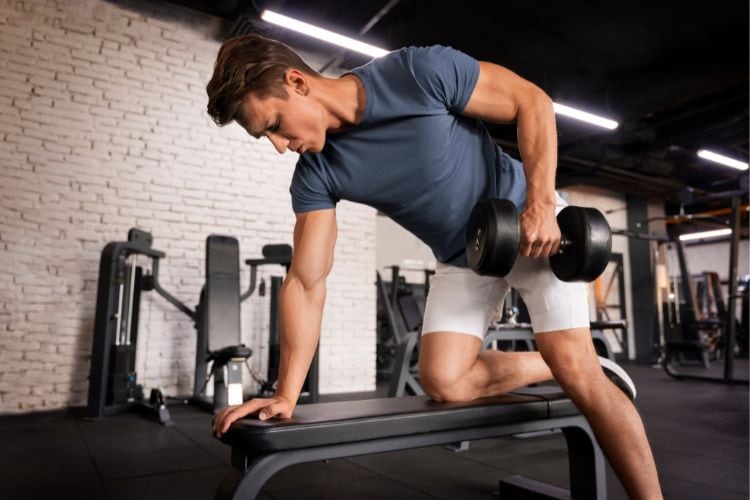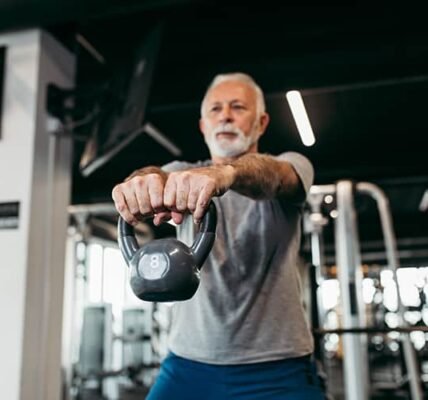
If you’re searching for a powerful and versatile way to build strength, increase muscle mass, and torch calories without needing a fully stocked gym, full-body workouts using dumbbells and a bench are your answer. Whether you’re a beginner or an experienced lifter, these exercises provide a highly effective strength-training solution adaptable to all fitness levels.
In this comprehensive guide, you’ll learn how to structure full-body dumbbell workouts, the best compound and isolation moves to incorporate, and how to maximize gains using just a pair of dumbbells and a bench.
Why Choose Dumbbells and a Bench for Full-Body Workout
Accessibility and Versatility
Dumbbells are one of the most accessible strength training tools and can be used in countless ways. When paired with a weight bench, they unlock a wider range of motion, allow for incline and decline positions, and support a variety of upper and lower body movements.
Full-Body Engagement
A smartly designed full-body dumbbell workout engages all major muscle groups, helping improve strength, endurance, coordination, and functional fitness. Plus, it allows for time-efficient workouts that maximize results in less than an hour.
Muscle Imbalance Correction
Unlike barbells or machines, dumbbells force each limb to work independently, addressing muscular imbalances and improving stabilization.
Benefits of Full Body Dumbbell Workouts with Bench
- Muscle growth and strength in chest, back, arms, core, glutes, and legs
- Improved joint stability and mobility through a wider range of motion
- Efficient calorie burn by combining compound lifts with minimal rest
- Greater flexibility in movement, especially for pressing and rowing exercises
- Home-gym friendly – minimal equipment needed
How to Structure a Full-Body Dumbbell and Bench Workout
To optimize your routine, you need a blend of compound movements (multi-joint) and isolation exercises (single-joint). Each workout should include:
- Push exercise (chest, shoulders, triceps)
- Pull exercise (back, biceps)
- Lower body move (quads, hamstrings, glutes)
- Core activation (abs and obliques)
Use the following structure:
- Warm-Up: 5–10 minutes of dynamic stretches or light cardio
- Main Workout: 6–10 exercises targeting all muscle groups
- Cool-Down: Stretching or foam rolling
Sets and Reps:
- For strength: 3–5 sets of 6–8 reps
- For hypertrophy: 3–4 sets of 8–12 reps
- For endurance: 2–3 sets of 12–20 reps
Best Dumbbell and Bench Workout Exercises for Full-Body Training
Here’s a list of the top full-body exercises using dumbbells and a bench, broken down by muscle groups.
Chest: Dumbbell Bench Press
How to Do It:
Lie flat on the bench holding a dumbbell in each hand. Lower them to chest level, then press them upward until your arms are extended.
Benefits:
Targets pectoral muscles, deltoids, and triceps. Offers greater ROM than barbell presses.
Shoulders: Seated Shoulder Press Dumbbell Workouts with Bench
How to Do It:
Sit upright on the bench. Press dumbbells overhead, keeping the core tight and elbows under wrists.
Benefits:
Builds shoulder mass and improves shoulder joint stability.
Back: Dumbbell Bench Row
How to Do It:
Place one knee and hand on the bench, holding a dumbbell in the opposite hand. Pull it toward your waist.
Benefits:
Isolates the lats, rhomboids, and traps. Helps improve posture and upper body pulling strength.
Arms: Incline Dumbbell Curl Workouts with Bench
How to Do It:
Sit on an incline bench with arms hanging down. Curl the dumbbells upward using controlled motion.
Benefits:
Increases bicep stretch and activates long head of the bicep for peak development.
Triceps: Dumbbell Skull Crushers
How to Do It:
Lie on the bench with dumbbells above your chest. Lower them toward your forehead by bending elbows, then extend back up.
Benefits:
Builds triceps mass and strength. Improves lockout strength in pressing movements.
Legs: Dumbbell Bulgarian Split Squats Workouts with Bench
How to Do It:
Stand in front of the bench and place your back foot on it. Hold dumbbells at your sides and perform a single-leg squat.
Benefits:
Works quads, glutes, and hamstrings. Enhances balance and single-leg strength.
Glutes: Dumbbell Hip Thrusts (Bench Supported)
How to Do It:
Rest your upper back on the bench with feet flat on the ground. Place dumbbell on your hips and drive them upward.
Benefits:
Directly targets glutes. Excellent for building lower body power and posture.
Core: Dumbbell Bench Leg Raises
How to Do It:
Lie flat on the bench holding dumbbells for support. Raise legs toward the ceiling, keeping core tight.
Benefits:
Engages lower abs. Adds difficulty to standard leg raises using the bench’s support.
Bonus: Dumbbell Renegade Row with Bench
How to Do It:
Place hands on dumbbells in a plank position, with feet on the bench. Row one dumbbell while stabilizing the core.
Benefits:
Combines core and back engagement. Great for total-body stabilization.
Sample Full-Body Dumbbell and Bench Workout (45 Minutes)
Here’s a full-body routine you can follow 2–3 times per week:
Warm-Up (5–10 Minutes)
- Jumping jacks
- Arm circles
- Hip openers
- Bodyweight squats
Workout Routine
| Exercise | Sets | Reps |
|---|---|---|
| Dumbbell Bench Press | 3 | 10 |
| Seated Dumbbell Shoulder Press | 3 | 10 |
| One-Arm Dumbbell Bench Row | 3 | 10 each |
| Incline Dumbbell Curl | 3 | 12 |
| Dumbbell Skull Crushers | 3 | 12 |
| Bulgarian Split Squat | 3 | 8 each leg |
| Dumbbell Hip Thrust | 3 | 12 |
| Dumbbell Bench Leg Raises | 3 | 15 |
| Renegade Row (feet on bench) | 3 | 10 each side |
Cool-Down (5–10 Minutes)
- Chest stretch on bench
- Hamstring stretch
- Cat-cow spinal mobility
- Deep breathing
Tips to Maximize Your Full-Body Dumbbell Bench Workouts
1. Use Progressive Overload
Track your sets, reps, and weight each session. Aim to increase one variable weekly.
2. Prioritize Form Over Weight
Start with manageable weights and focus on proper technique to prevent injury.
3. Incorporate Supersets
Pair opposing muscle groups (e.g., chest and back) for time efficiency and intensity.
4. Adjust Bench Angles
Use flat, incline, or decline positions to target different areas of the muscle.
5. Rest Strategically
Rest 30–60 seconds between sets for hypertrophy. For strength, rest up to 2 minutes.
Who Should Do Full Body Dumbbell and Bench Workouts?
These workouts are ideal for:
- Beginners looking to build foundational strength
- Busy professionals needing efficient 30–45 minute routines
- Home gym users with limited equipment
- Athletes seeking functional, full-body training
- Anyone wanting to tone, sculpt, or maintain lean muscle
Full-Body Dumbbell Workout Weekly Plan (3 Days/Week)
Day 1: Strength Focus
- Heavier weight
- Lower reps
- Emphasis on compound moves
2: Hypertrophy Focus
- Moderate weight
- 8–12 reps
- Include more isolation
3: Metabolic Conditioning
- Lighter weight
- 15–20 reps
- Circuit style with minimal rest
This rotation ensures progressive development and prevents burnout.
Safety Tips for Bench and Dumbbell Training
- Always warm up joints and muscles before lifting
- Use collars if you’re lifting heavy adjustable dumbbells
- Never lock your elbows or knees at full extension
- Keep your bench stable—ensure it’s placed on a flat surface
- If you’re unsure, work with a coach or trainer to review form
Train Smarter with Dumbbells and a Bench
A well-structured full-body dumbbell and bench workout program can rival any gym machine or barbell plan. It offers mobility, muscle symmetry, and real-world strength gains. Plus, it’s efficient, scalable, and can be done in nearly any setting.
Whether you’re training at home, traveling, or just seeking variety in your strength routine, this method can help you stay strong, sculpted, and consistently progressing.



